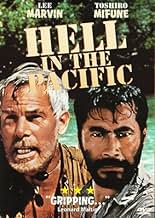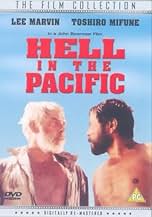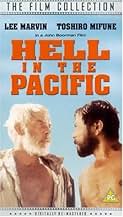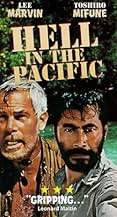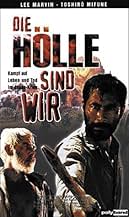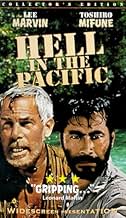VALUTAZIONE IMDb
7,2/10
9509
LA TUA VALUTAZIONE
Durante la seconda guerra mondiale, un pilota americano e un capitano della marina giapponese abbandonato sono deserti su una piccola isola disabitata nell'Oceano Pacifico. Lì, devono cooper... Leggi tuttoDurante la seconda guerra mondiale, un pilota americano e un capitano della marina giapponese abbandonato sono deserti su una piccola isola disabitata nell'Oceano Pacifico. Lì, devono cooperare se vogliono sopravvivere, ma ci riusciranno?Durante la seconda guerra mondiale, un pilota americano e un capitano della marina giapponese abbandonato sono deserti su una piccola isola disabitata nell'Oceano Pacifico. Lì, devono cooperare se vogliono sopravvivere, ma ci riusciranno?
- Regia
- Sceneggiatura
- Star
- Premi
- 1 vittoria e 2 candidature totali
Toshirô Mifune
- Captain Tsuruhiko Kuroda
- (as Toshiro Mifune)
Recensioni in evidenza
Anti-war movies have come in many shapes and sizes – from the shocking to the satirical, from the blunt to the oblique – but few are as simply effective as Hell in the Pacific. At turns suspenseful, mysterious, cartoonishly funny and touchingly human, it boils the conflict down to the adventures of two men on opposite sides forced to share an island, but rather than just being a trite allegory, it convincingly demonstrates the benefits of co-operation over competitiveness, and shows that mistrust and enmity are not necessarily innate.
Ignoring the ridiculously abrupt ending, Hell in the Pacific is excellent in its structure. Considering that the target audience is going to be English-speaking (although the experience would not be too diminished for a Japanese audience) the story is told in the beginning from the perspective of the Japanese man. The American character is a mere presence amid the trees, and the fact that we can understand him is of little consequence because he doesn't say much of relevance. The Toshiro Mifune character is more loquacious, even though most viewers won't know what he's saying, and Lee Marvin's relative quietness emphasises the wordless savagery of the first half. It's only as the picture progresses and the men become more amiable towards each that they become recognisably human characters. But even this is done more through imagery than words, giving us an equally good impression of the two of them despite the language barrier.
This telling from the Japanese point-of-view is also reinforced in the methods of director John Boorman, who often makes the camera Mifune's eyes or keeps him up front while Marvin lurks in the background. Other than that, Boorman's style as a director is like a love letter to Akira Kurosawa and Sergio Leone, the latter especially. He gives us gnarly close-ups, a dynamic rhythm and eye-catching tableaux such as the shot of Marvin and Mifune as they arrive on the second island, like statues about to leap into action. It is all very overtly stylised, but it is a pretty neat way of keeping this story of such simple elements constantly interesting and engaging.
Toshiro Mifune is well-known to even the most casual of foreign cinema buffs, being the favourite star of the aforementioned Kurosawa. It's nice to see him used well in this less familiar context. The only other non-Japanese picture I have seen him in is a bizarre British-made Western called Red Sun, which is incidentally one of the worst films I have ever seen. You notice, seeing him here opposite Lee Marvin, he is not a tall man, but he makes up for this with his strong presence and irascible energy. But it's not all about the rage. I like here his passively bemused responses when Marvin is ranting at him. Lee Marvin shows his easy capacity for turning a serious-sounding performance into something surprisingly comical, such as his acting out of throwing the stick and picking it up.
Appropriately for a movie of few words, music plays a big part in Hell in the Pacific. The Lalo Schifrin score is by turns haunting, playful, and sometimes teasingly melodramatic. It is an unusually big score for a movie that is otherwise so minimalist, but its constant variation and inventiveness suits the action very well. And, aside from the power of its message, this is part of what makes Hell in the Pacific so appealing. It is all of a piece, a mesmerising tone poem on a the fate of humanity.
Ignoring the ridiculously abrupt ending, Hell in the Pacific is excellent in its structure. Considering that the target audience is going to be English-speaking (although the experience would not be too diminished for a Japanese audience) the story is told in the beginning from the perspective of the Japanese man. The American character is a mere presence amid the trees, and the fact that we can understand him is of little consequence because he doesn't say much of relevance. The Toshiro Mifune character is more loquacious, even though most viewers won't know what he's saying, and Lee Marvin's relative quietness emphasises the wordless savagery of the first half. It's only as the picture progresses and the men become more amiable towards each that they become recognisably human characters. But even this is done more through imagery than words, giving us an equally good impression of the two of them despite the language barrier.
This telling from the Japanese point-of-view is also reinforced in the methods of director John Boorman, who often makes the camera Mifune's eyes or keeps him up front while Marvin lurks in the background. Other than that, Boorman's style as a director is like a love letter to Akira Kurosawa and Sergio Leone, the latter especially. He gives us gnarly close-ups, a dynamic rhythm and eye-catching tableaux such as the shot of Marvin and Mifune as they arrive on the second island, like statues about to leap into action. It is all very overtly stylised, but it is a pretty neat way of keeping this story of such simple elements constantly interesting and engaging.
Toshiro Mifune is well-known to even the most casual of foreign cinema buffs, being the favourite star of the aforementioned Kurosawa. It's nice to see him used well in this less familiar context. The only other non-Japanese picture I have seen him in is a bizarre British-made Western called Red Sun, which is incidentally one of the worst films I have ever seen. You notice, seeing him here opposite Lee Marvin, he is not a tall man, but he makes up for this with his strong presence and irascible energy. But it's not all about the rage. I like here his passively bemused responses when Marvin is ranting at him. Lee Marvin shows his easy capacity for turning a serious-sounding performance into something surprisingly comical, such as his acting out of throwing the stick and picking it up.
Appropriately for a movie of few words, music plays a big part in Hell in the Pacific. The Lalo Schifrin score is by turns haunting, playful, and sometimes teasingly melodramatic. It is an unusually big score for a movie that is otherwise so minimalist, but its constant variation and inventiveness suits the action very well. And, aside from the power of its message, this is part of what makes Hell in the Pacific so appealing. It is all of a piece, a mesmerising tone poem on a the fate of humanity.
I only discovered Hell in the Pacific after searching for Lee Marvin films as I have become enamored with his work as of late. I thought this was going to be a war movie from start to finish, which I'm not always a big fan of. I am glad to say I was surprised and very pleased with this film.
This is a rare work of film that uses two actors, limited dialog(half of it in Japanese), and only one location. There have been many attempts at making movies about people stranded on islands, but this one pulls it off in a way no other has.
Thsi is a film about not only survival, but overcoming prejudice towards ones sworn enemy in a time of war. It is about moving past the fears of what you do not know, and using what you do know and the basic need to survive to pull through and band together.
I was more enthralled by this movie with almost no dialog, than I have been with movies that have won screenplay Oscars. To me, this is an example that if you have the right actors, the right story, and the right setting, dialog is not always necessary.
This is a rare work of film that uses two actors, limited dialog(half of it in Japanese), and only one location. There have been many attempts at making movies about people stranded on islands, but this one pulls it off in a way no other has.
Thsi is a film about not only survival, but overcoming prejudice towards ones sworn enemy in a time of war. It is about moving past the fears of what you do not know, and using what you do know and the basic need to survive to pull through and band together.
I was more enthralled by this movie with almost no dialog, than I have been with movies that have won screenplay Oscars. To me, this is an example that if you have the right actors, the right story, and the right setting, dialog is not always necessary.
Was there a better hard man in the 70's then Lee Marvin ? I don't think so. Team him up with Toshiro Mifune (yojimbio, Seven Samurai), gorgeous scenery (Paulau islands) under the light hand of John Borman (Deliverance) and watch as a simple story grows and develops into a visual feast. There is no lead-in to the film, all we see is a lone Japanese soldier on a tropical island spotting a life raft and realising he is suddenly not alone, and worse, his company is an enemy soldier. The initial confrontations are tension filled as the two chase each other around and around their new home in a battle of wits and cunning. Eventually the inevitable happens and they are forced to start living together. Rather than a Disneyish style 'lets all learn to live together because we are all really the same under the skin' co-operation, the two have as little to do with each other as possible, unless arguing about possession of driftwood (in a scene that left me in tears of laughter). Eventually they do co-operate through necessity to leave the island and develop a bond of friendship through adversity, only to have this challenged when exposed to the realities of the world outside their desert island refuge. A bitter but unavoidable ending reminds us of the insanities of war. I loved this film because it was totally gripping in a way few movies are, I genuinely cared about the characters. It was in some ways like watching 'survivor' in the way the relationship changed-only in reverse- so naturally did it happen on screen. Bormans direction was great, more of a fly on the wall perspective that made the story all the more involving. This movie deserves to be seen.
What I would give to know only Japanese and watch this movie. You don't have to understand what Toshiro Mifune is saying to understand this movie.
Does war extend to the individual? Trained to kill or be killed, two adversaries face off. Each with his own fear that the other will succeed. Why didn't they kill each other when they had the chance? Because man is a social animal and he needs the company of others. To use a cliché - No man is an island.
And in the end conflict erupts. Not because of any innate difference between the two men - but because of how they define themselves in a greater scene. I am Japanese - you are American (and vice versa). Throw in the element of non-communication (neither spoke any of the other's language) and you have it.
Two great actors, a great script, a grand theme.
Does war extend to the individual? Trained to kill or be killed, two adversaries face off. Each with his own fear that the other will succeed. Why didn't they kill each other when they had the chance? Because man is a social animal and he needs the company of others. To use a cliché - No man is an island.
And in the end conflict erupts. Not because of any innate difference between the two men - but because of how they define themselves in a greater scene. I am Japanese - you are American (and vice versa). Throw in the element of non-communication (neither spoke any of the other's language) and you have it.
Two great actors, a great script, a grand theme.
Isolation in extreme conditions allows for very telling studies of human beings, and potentially unpleasant philosophical conclusions. Marooning a character on an island will get you some dramatic results, and the only way to take it a step further is to maroon that character's worst possible enemy with him. That's what Hell in The Pacific proposes.
This is not Cast Away Meets WWII. For one thing, it has a much tighter focus, completely losing anything beyond the island's horizon. It is admirable in its bloody-minded focus, and, with only two actors to cast, it's hard to imagine how it could have been any more perfect that pitching wild-man extraordinaire Lee Marvin opposite Kurosawa favorite Toshiro Mifune. A genius idea, but one that could have failed with a more conventional approach.
We are introduced to both antagonists in a neutral way, free to prefer which ever one we choose, though that is hardly the point, and director John Boorman makes it both easy and at times hard to sympathise with either in equal measure. Both actors do a fine job, playing mostly emotional and physical roles with great restrain and intelligence.
Boorman's direction is perfect, rejecting excess stylization in favor of a subtle approach, aided by superb photography. You have got to see this at least once, simply because, for all its visceral thrills, it is quite profound without ever trying to be. Because it boasts top performances from two of the last century's greatest leading presences in action cinema. Because, though frustrating at first, the ending is, for once, the smartest one that could have been chosen. Humanity is on trial and the judges choose to be honest and pragmatic, thus delivering something that combines greatness and very thoughtful substance.
We need more films like this!
This is not Cast Away Meets WWII. For one thing, it has a much tighter focus, completely losing anything beyond the island's horizon. It is admirable in its bloody-minded focus, and, with only two actors to cast, it's hard to imagine how it could have been any more perfect that pitching wild-man extraordinaire Lee Marvin opposite Kurosawa favorite Toshiro Mifune. A genius idea, but one that could have failed with a more conventional approach.
We are introduced to both antagonists in a neutral way, free to prefer which ever one we choose, though that is hardly the point, and director John Boorman makes it both easy and at times hard to sympathise with either in equal measure. Both actors do a fine job, playing mostly emotional and physical roles with great restrain and intelligence.
Boorman's direction is perfect, rejecting excess stylization in favor of a subtle approach, aided by superb photography. You have got to see this at least once, simply because, for all its visceral thrills, it is quite profound without ever trying to be. Because it boasts top performances from two of the last century's greatest leading presences in action cinema. Because, though frustrating at first, the ending is, for once, the smartest one that could have been chosen. Humanity is on trial and the judges choose to be honest and pragmatic, thus delivering something that combines greatness and very thoughtful substance.
We need more films like this!
Lo sapevi?
- QuizBoth Lee Marvin and Toshirô Mifune actually served in the Pacific during World War II, of course on opposing sides. Marvin was a US Marine. He was wounded during the war and received the Purple Heart during the Battle of Saipan in 1944. Mifune served in the Imperial Japanese Army Air Service.
- BlooperLee Marvin was 44 at the time of filming, as evident by his gray hair. Toshiro Mifune's character also calls him an "old man" several times. WWII US Navy pilots Thus, he looks much too old for an actual WWII US Navy pilot, who were mostly in their twenties or early thirties.
- Citazioni
American Pilot: Oh, for a second I thought you were a Jap.
- Versioni alternativeAmerican version featured an alternative ending where the two get drunk and walk off in separate directions arguing at each other; in the British version (which was exactly the same as the Japanese version), they start yelling and a bomb from the sky falls and blows everything apart.
- ConnessioniFeatured in Hollywood Remembers Lee Marvin (2000)
I più visti
Accedi per valutare e creare un elenco di titoli salvati per ottenere consigli personalizzati
- How long is Hell in the Pacific?Powered by Alexa
Dettagli
Botteghino
- Budget
- 4.150.000 USD (previsto)
- Tempo di esecuzione1 ora 43 minuti
- Proporzioni
- 2.35 : 1
Contribuisci a questa pagina
Suggerisci una modifica o aggiungi i contenuti mancanti

Divario superiore
By what name was Duello nel Pacifico (1968) officially released in India in English?
Rispondi

